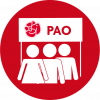Organisational development
Why is building stronger organisations important?
The Olof Palme International Center strives to contribute to long-term change through project financing or core support. (More about the difference between the two under Planning and application.)
Irrespective of whether the operation is financed in project form or through core support, organisational development is a key aspect of the working relationship. A strong, well-developed civil society that consists of democratic organisations firmly deployed among the people is a precondition for democracy and societal development. So, it is not enough simply to focus on the operation; attention must also be paid to how the organisation conducting the operation is structured, and how it needs to develop and become more representative of its target group, as well as more democratic, transparent and sustainable.
What is organisational development?
Organisational development is an umbrella term for different measures intended to improve the capacity of an organisation to achieve its aims.
Organisational development is both about internal democracy and other types of conditions for carrying out operations.
Organisational development must be an ongoing process, given that we are active in a changing environment. Organisational development is thus not a temporary initiative to which you apply yourself for a part of the year – it should be a continuous, systematic and conscious process. It is important to maintain an ongoing discussion about the purpose of the organisation, the people who work in the organisation and its members, work processes, methods and systems, the vision and the message, and how all of these are communicated to the general public.
An organisation needs not only to develop its capacity to handle current issues and the issues it is possible to predict. It must also be able to deal with any unknown future problems and challenges.
In many countries, the concept of “civil society” is new and untried, and there may not necessarily be the same tradition for popular movements as there is in Sweden, for example. Democratic development demands organisations that are broadly deployed among the population, democratic, open to insight and with a constant capacity to learn and develop in step with their surroundings.
It is not only a matter of actually contributing to change – how you do so is equally important. An organisation cannot credibly attempt to implement democratic changes unless it uses democratic means itself. That is why it is essential to focus on internal democracy and organisational development.
At the beginning of a partnership: Who are you?
True partnership is built on the partner organisations sharing values and ideology. It has to do with having a common goal and understanding one another’s long-term priorities, expectations, strengths and experiences. In connection with the submission of an application, you as a partner organisation are required to complete an organisation description, but it is a good idea to do this even earlier in the process. It can then serve as the basis for discussions on shared values and prove useful in helping you and your Swedish partner organisation become better acquainted with each other. In the initial stages, it is important to clarify your respective organisations’ goals for the partnership, as well as your needs with regard to the partnership and the operation.
In addition to establishing whether all partners share a common value base, it is necessary to take into account your organisation’s capacity to carry out the planned operations.
- What are your organisation’s strengths and weaknesses?
- What is the status of the internal democracy?
- What is your administrative capacity?
For tips about how to conduct this overview, it is a good idea to contact your programme manager.
Internal democracy
Internal democracy is a key aspect of organisational development. The Olof Palme International Center believes that for civil society organisations, political parties and associations to contribute to democratic societal development, they themselves must be democratically structured and must apply democratic methods. Not only is internal democracy an important principle in and of itself – and necessary in contributing to democratic development – but it is also a precondition for ensuring that an organisation is sustainable. Briefly put, internal democracy has to do with securing democratic decision-making within an organisation, an association or a political party.
Sustainability
The working relationship may run for anything from a year to decades, but the purpose is always to contribute to results that are “sustainable”, meaning that they hold true for the target groups and the organisations.
Sustainability is about institutionalising the successes of the operation within the popular movement, the party, the organisation or local authorities in such a way that it is not possible to “reverse direction”.
Assessing risks and performing a risk analysis
We define risk as the likelihood of an incident that negatively affects our operation. There may be risks that affect your organisation, the activities of the project or operation, and the possibility of achieving the goal.
That’s why you need a good strategy for risk management. That means taking a preventative approach in your work, and having a solid plan in the event that something should happen which affects the operation in an undesirable manner. During the planning of the operation, it is therefore necessary to conduct a risk analysis.













